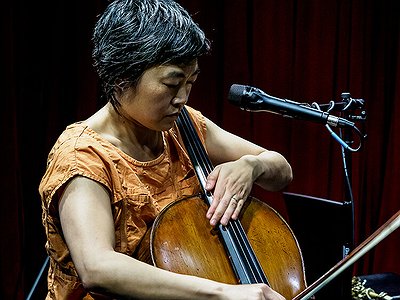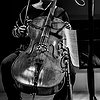Part 1
Name: Theresa Wong
Nationality: American
Occupation: Cellist, vocalist, composer, improviser
Current release: Harbors, a collaboration between Theresa Wong and Ellen Fullman, is still available from Room 40.
If these thoughts by Theresa Wong piqued your interest, visit her excellent website for everything you ever wanted to know about her and recent updates.
We also conducted an expansive Ellen Fullman interview, her creative partner on Harbors.
If you were to grab your cello right now, what kind of tuning would it have?
My cello is currently tuned to A 220 Hz in equal tempered fifths because I teach in this tuning, but my preferred tuning at the moment is A 216 Hz in just fifths.
Your recent release Harbors is not the first time you've worked with tuning systems outside the realm of 12 tone equal temperament. What sparked your interest in the world of these 'alternative' tuning systems?
My interest began when I started playing together with Ellen Fullman back in 2006. Our first session improvising together was really extraordinary because I was purely listening and not thinking about tuning.
Then when we continued to meet and play, I realized my lack of knowledge of just intonation was a barrier. I felt I was always terribly out of tune and didn't understand why. I wanted to get back to the magic of our first session so I began to learn about just intonation.
You're not just a composer and a cellist, but also a singer. How has that shaped your ideas about pitch, would you say?
I began to learn more about tuning systems through reading and singing exercises in W.A. Mathieu's book, "Harmonic Experience". Singing gives me a very physical understanding of resonance since I experience pitch relationships directly in my body.
Also touching on the Indian vocal tradition of using 'sar-gam' and how certain syllables can affect the body and mind in a wholistic way, I began to be more conscious of how pitch, tuning, and the sounds we create can have very concrete effects on the world around us.
How do you tune your cello? By ear? Using electronic tools? Is there a natural degree of 'uncertainty' that you'll allow?
I use the Peterson tuner app because I can see both Hertz and cents deviation to orient myself to any given tuning. However, I'm currently finishing a solo album of pieces for voice and cello which includes about seven different tunings on the cello, ranging from completely accidental (i.e. me randomly moving the pegs around and then improvising a piece) to carefully composed tunings in scordatura, which I generally create by ear.
The way an instrument is tuned is so connected to tradition, history, and culture, so expanding the tunings I use is a way for me to subvert, embrace and re-generate my musical past and present all at once.
While learning your instrument and studying, how did your teachers deal with the subject of tuning -was it a topic at all?
No, not at all. I'm still astonished at this and try to introduce the concept of tuning early on to my cello students. Of course it gets overwhelming quickly when simply trying to understand equal temperament is hard enough for a student, but I always frame equal temperament as one system among many.
What challenges does playing in different tuning systems present to you as a performer? If you're performing a piece in a different and new-to-you tuning, how will you approach this?
A new tuning system can be very disorienting at first, but in a way it's similar to the excitement and challenge of being in a new place you've never been before. At first you can't take anything for granted, but once you get more familiar with the territory, the music opens you up to new experiences and terrains.
As with learning a new language, I like to approach a new tuning system from several sides. The first is listening - so it could be compositional fragments made with midi, or setting up an electronic or acoustic instrument and playing it to absorb the sound and feel of a particular tuning. It's similar to absorbing a new language through listening to the radio, television or people talking on the streets.
When I lived in Italy and was just starting to learn the language, I would sometimes dream little fragments of sentences in Italian without even understanding what they meant. I realized there is a very special way in which sounds enter our brains and germinate! (I often think of the phrase from William Burroughs, 'Language is a virus from outer space'.) Like with earworms, I sometimes just wake up with a phrase from a new tuning in my head because it has been wandering around my neural pathways subconsciously at night.
Then there is the aspect of studying the nuts and bolts of a language and understanding things like grammar, syntax and spelling. In learning a musical tuning, I try to understand how the pitches are generated, their relationship to one another and the theory behind the system in which they exist.
The third aspect is to put it into practice; that is, making sound on my instruments with this new harmonic vocabulary. Ultimately the goal is to make music - and the tuning should serve this purpose rather than be an end in itself. Similarly, one has to practice speaking and writing to make use of a language.
Tuning is often presented as nothing but algebra. But there also seems to be a psychological aspect of the topic. Would you say that different tuning systems are capable of expressing different, and potentially unique emotional states?
Definitely. Again, I find myself going to a cultural and linguistic metaphor. I grew up speaking Cantonese, and subsequently learned English, German and Italian as well. So tuning and language are very connected for me, especially since there are seven different ways of intoning a vowel in Cantonese.
Just as the syntax, sound and semiotics of each language afford nuanced and unique ways of experiencing and expressing oneself, different tuning systems offer very unique colorations of emotional and expressive states.
Do different tuning systems suggest different kinds of music? What are some of the creative possibilities that attracted you in seeking out and performing in these systems?
Yes - definitely. I've always been attracted to new experiences which open my awareness. In school, whenever I had to study harmonic theory (from a Western classical perspective), it always seemed arbitrary to me. When I began to learn about just intonation, suddenly there was a mathematical logic to why harmony worked the way it did. In my own creative work, I have always tried to steer away from familiar sound worlds; like a 'classical sound' or a 'jazz sound' or a 'rock sound'. I never feel like I really belong in any genre and those sounds have a lot to do with what harmony they're built on.
I think many post-modern composers moved into areas like noise, timbre, music concrète, microtonality and electronics because the resources of 12 equal tones became depleted. How has harmony developed in the last fifty years? I am attracted to composing in alternate tuning systems because there is a potential for creating truly new sounds and also to connect with past sounds of cultures and traditions that have been marginalized.






